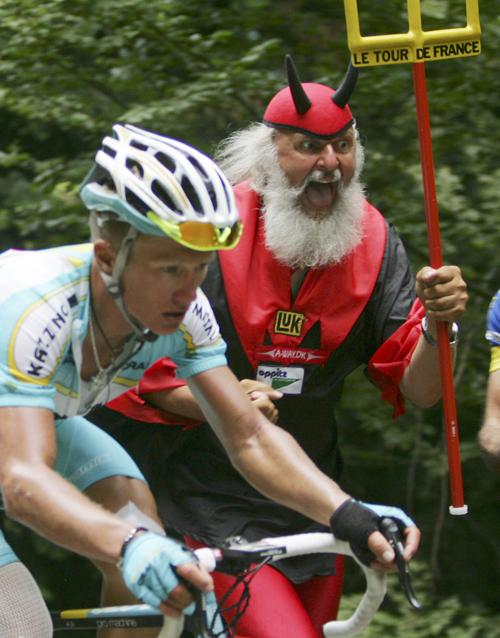Fan favorite tests positive for doping
July 25, 2007
PAU, France – Cycling fans loved the rider they called Vino. And he loved to deliver results – just not the type that came out of a laboratory on Tuesday and ended his run in this year’s Tour de France.
Alexandre Vinokourov was a pre-race favorite who excited Tour fans by rebounding from a bad crash in the fifth stage to stay in contention until Sunday’s 14th stage. Then he won Monday’s stage as consolation but on Tuesday – a rest day – came news he tested positive for a blood transfusion after winning Saturday’s time trial.
His B sample is expected by the end of the week, coinciding with the end of another tainted Tour.
Astana suspended the Kazakh rider and also withdrew its team from the Tour, ending the chances of its best-placed rider, Andreas Kloeden, who was fifth. Vinokourov was 23rd.
“Alexandre denies having manipulated his blood,” Astana manager Marc Biver said, adding that Vinokourov believes the “blood anomalies in his body” may have resulted from the crash.
Get The Daily Illini in your inbox!
During the fifth stage on July 12 from Chablis to Autun, Vinokourov fell and hurt his knees so badly that he needed at least 30 stitches. He refused to pull out and slogged up the Alps even though he was losing time to his rivals.
Biver then spoke well of his star.
“He’ll go to his limit and will die on the bike if he has to,” Biver said. “He’ll do everything to stay in the Tour.”
On the eve of this year’s Tour, international cycling chief Pat McQuaid questioned Vinokourov’s relationship with Italian doctor Michele Ferrari, saying it damaged the sport’s credibility as it tries to repair its tarnished image.
Vinokourov, who placed third in 2003 and fifth in 2005, said he used Ferrari as a physical trainer and not for medical purposes.
“It might very well be an innocent training relationship. I have to accept what he says,” McQuaid said earlier this month. “To try and reclaim the credibility of the sport, it would be better if he did not work with him. No matter what victories Vinokourov has, people will question them because of his relationship with Ferrari.”
Last year, Ferrari was cleared by an Italian appeals court of distributing health-threatening doping products to athletes. He has always denied he dispensed illegal substances. Biver defended his rider, despite McQuaid’s concerns that Vinokourov was working with someone outside the team.
“We have an ethics code which is clear: It stipulates that the athlete does not have the right to consult a doctor outside the team,” Biver said. “Michele Ferrari is not the doctor of Alexandre Vinokourov, but is his trainer.”
On Saturday, Vinokourov blew away the field with a remarkable performance on a 34-mile time trial around Albi. He was 1:14 in front of second-place Cadel Evans of Australia, and 1:39 ahead of Kloeden.
After winning the clock race, Vinokourov was just over five minutes behind race leader Michael Rasmussen with three Pyrenees stages ahead – and promised to attack.
But the next day Vinokourov fell apart on the Port de Pailheres, losing 28:50 to Rasmussen and dropping to 30th place and out of contention.
With his Tour resembling a heart monitor reading, Vinokourov recovered overnight and attacked early in Monday’s 15th stage from Foix to Loudenvielle-Le Louron for his fifth career Tour stage win, earning more glowing tributes.
L’Equipe splashed “Vino’s Courage” on its front page Tuesday, while inside the French sports daily Vinokourov spoke of how he “inspires respect” from other riders







